Tara Newbold death: Duane Ballin jailed for GBH but not murder
- Published
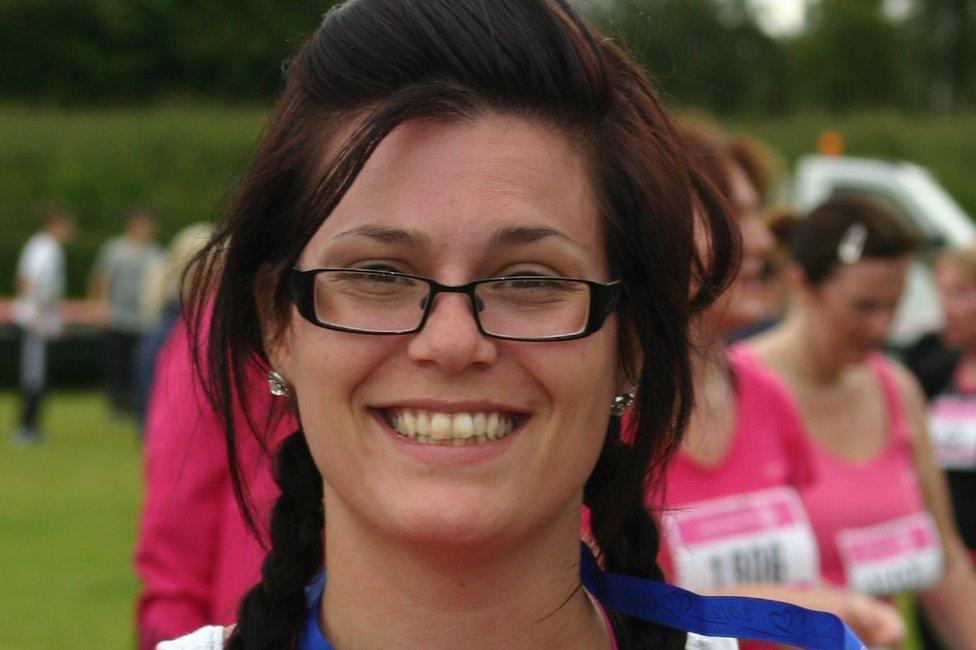
Tara Newbold was 29 when she died and lived in West Bridgford in Nottinghamshire
A man who told police "I think I've killed my girlfriend" after beating her hours before she died has been jailed for the attack but not murder.
Duane Ballin, 35, beat Tara Newbold with a rolling pin so severely her mother struggled to identify her body.
Police began a murder inquiry but a pathologist said cocaine toxicity was the "most likely" cause of death, rather than her injuries.
He was jailed for 15 years for causing grievous bodily harm with intent.
The post-mortem examination of Ms Newbold, 29, listed 37 recent injuries to her head, torso, arms and legs but concluded they were not the cause of her death.
Unhappy with the pathologist's findings, her mother and stepfather Julie and Peter Dury instructed another pathologist, who said her injuries could not be excluded from having played a part in her death.
Mr and Mrs Dury believe Ballin should have been charged with murder and justice has not been "fully served".
The Crown Prosecution Service (CPS) said Ballin was charged with an offence where it was "satisfied there was a realistic prospect of conviction".
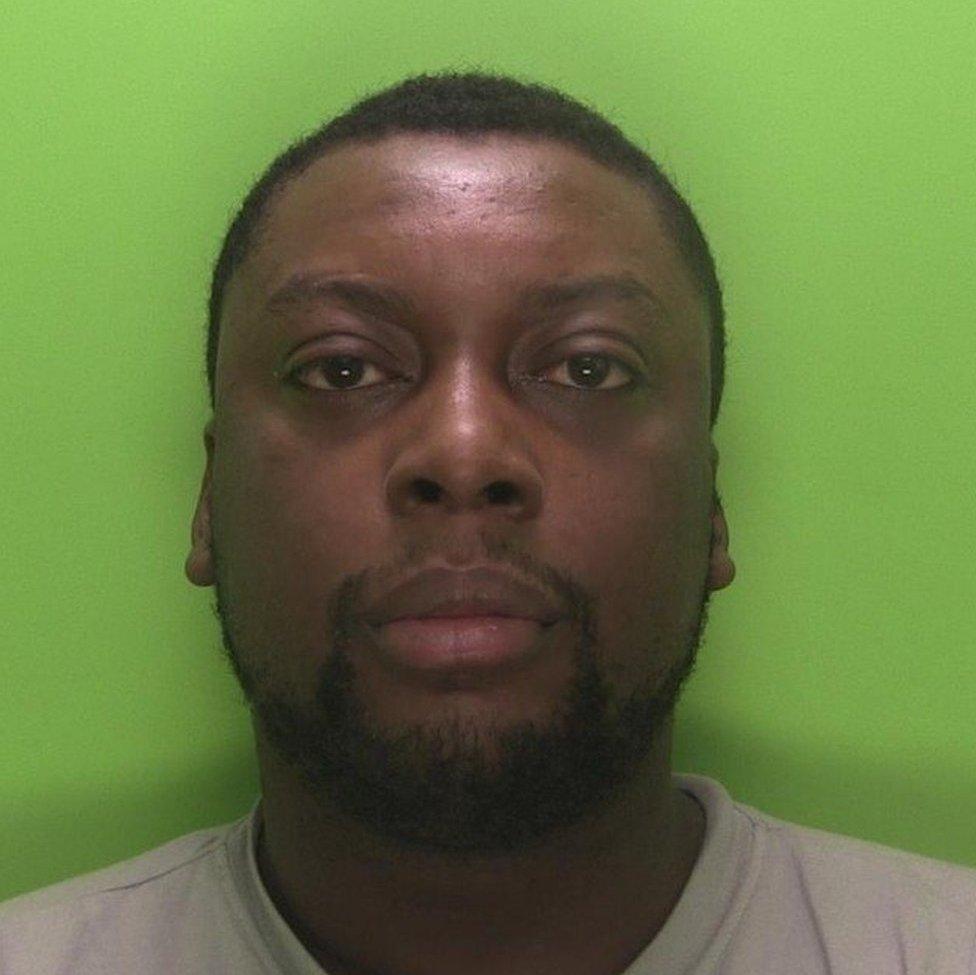
Duane Ballin, now 35, had been in an on-and-off relationship with Tara Newbold since he was 19
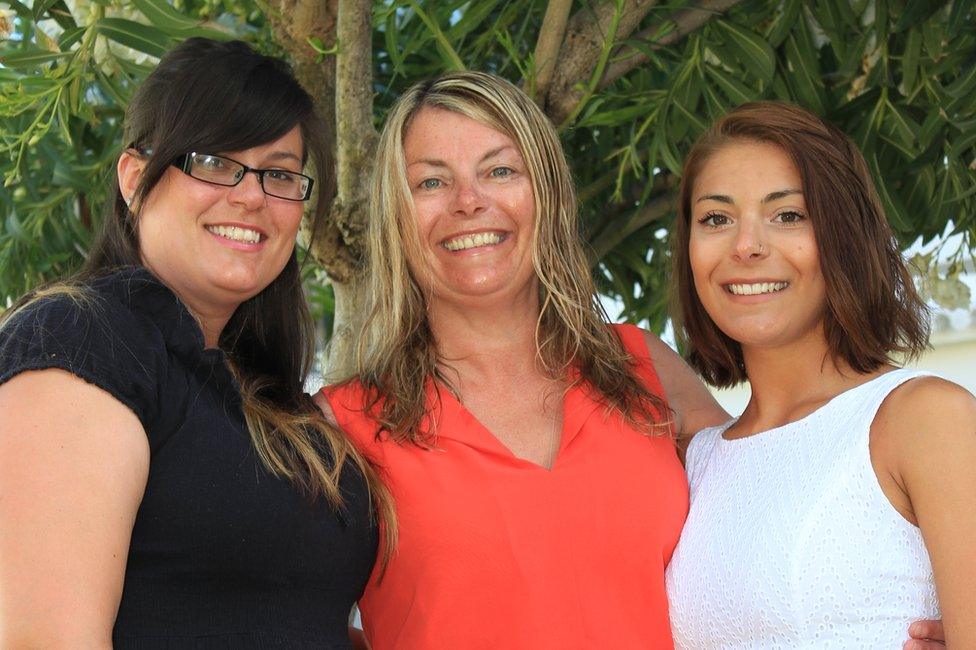
Julie Dury, shown here with Tara Newbold and her other daughter, believes Duane Ballin is "evil"
Mr Dury, said: "She looked like she had been in a traffic accident, not beaten.
"I didn't recognise her to start with and Julie later said that she hadn't either - she had to really look closely."
Mrs Dury said: "He's damaged so many people's lives - the children, ourselves, the wider family. All I can say is he's evil."
Judge Gregory Dickinson QC gave Ballin an extended sentence of 18 years, comprising a custodial term of 15 years and a further licence period of three years.
Was there a history of domestic abuse?
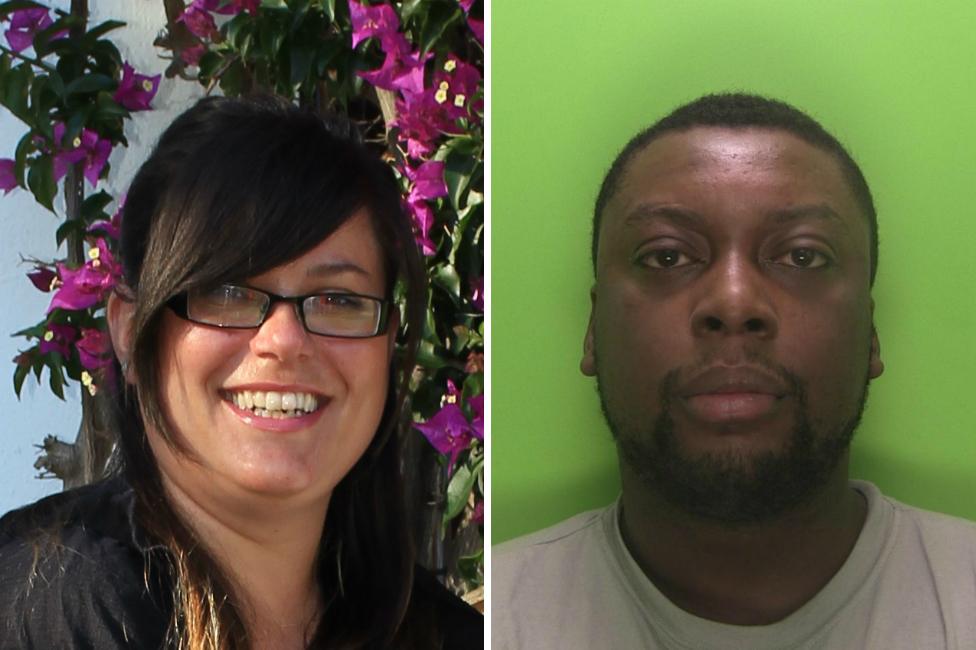
Tara Newbold first became pregnant when she was 15 and she had two further children with Duane Ballin
Ms Newbold had been in an on-and-off relationship with Ballin since she was 15 and he was 19. She became pregnant with the first of their three children at 15.
"Tara was vulnerable, she thought it was great he was an older man," said her mother.
She said she first became aware Ballin was violent when her daughter was 17 and pregnant again.
"He actually hit Tara while she was holding [her first child] and she was pregnant with her second," said Mrs Dury.
"She didn't want us to call the police. From that minute I knew that this was going to be her life. I knew he was always going to be like that."
Ballin then got another woman pregnant and went to live with her.
However, Ballin and Ms Newbold later got back together and she gave birth to their third child in July 2013.
Mrs Dury said the abuse became "a lot more obvious" from then on. "If we went round and he was there you could see she was on edge.
"On occasions I saw bruises. Once she came round and her face was just battered - she had two black eyes."
Judge Dickinson told Ballin there was "evidence that you had in the past assaulted Tara", but Ballin was never charged over these alleged assaults, so the sentence could not take them into account.
The judge added: "There is evidence you dominated, controlled and bullied Tara. That seems to me to be crystal clear."
What happened on the day she died?
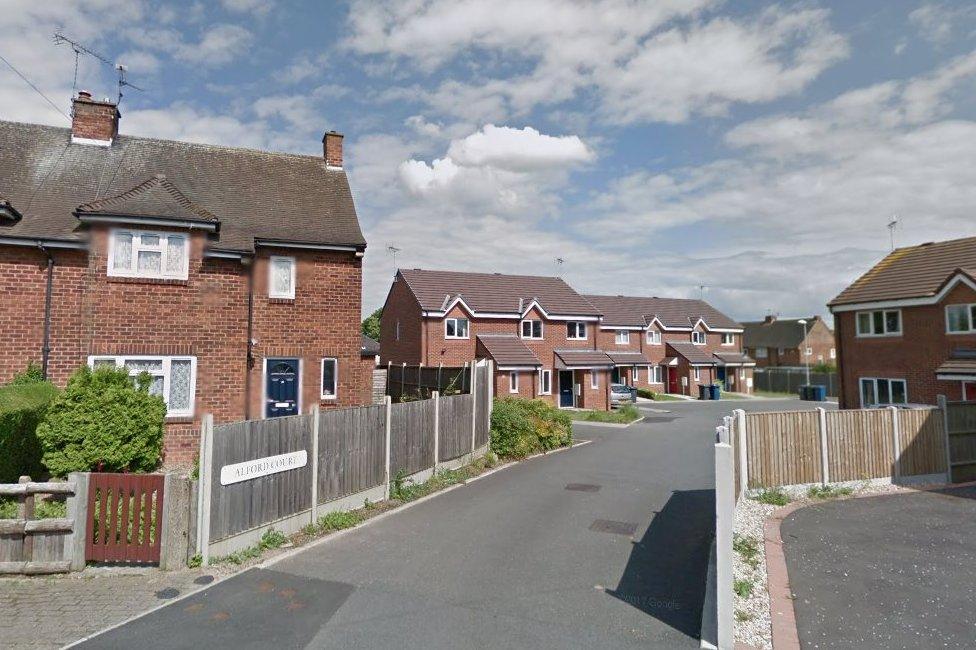
Duane Ballin assaulted Tara Newbold at the home they shared in Alford Court, West Bridgford, Nottinghamshire
Ms Newbold died in the home she shared with Ballin in Alford Court, West Bridgford, Nottinghamshire, on the morning of 25 October 2016.
Ballin is thought to have assaulted her at about midnight, and he told his trial he used a rolling pin to beat her.
The couple's three children were at home and heard the attack. Part of it was also witnessed by their three-year-old daughter.
"Your three-year-old witnessed some of this and told her brothers she had seen daddy hitting mummy with a rolling pin," the judge told Ballin.
"For these children, the last memory of their mother is her crying and screaming and shouting 'Duane, stop'."
Police said Ballin did an internet search for "feeling cold when dying" and "the dying process".
His trial heard he did not phone the emergency services until after Ms Newbold had died.
He took the children to his sister's house, phoned for an ambulance, then handed himself in at a police station and told a custody officer: "I think I've killed my girlfriend."
Ballin was found to have cocaine in his system when he was arrested.
What did the post-mortem examination find?
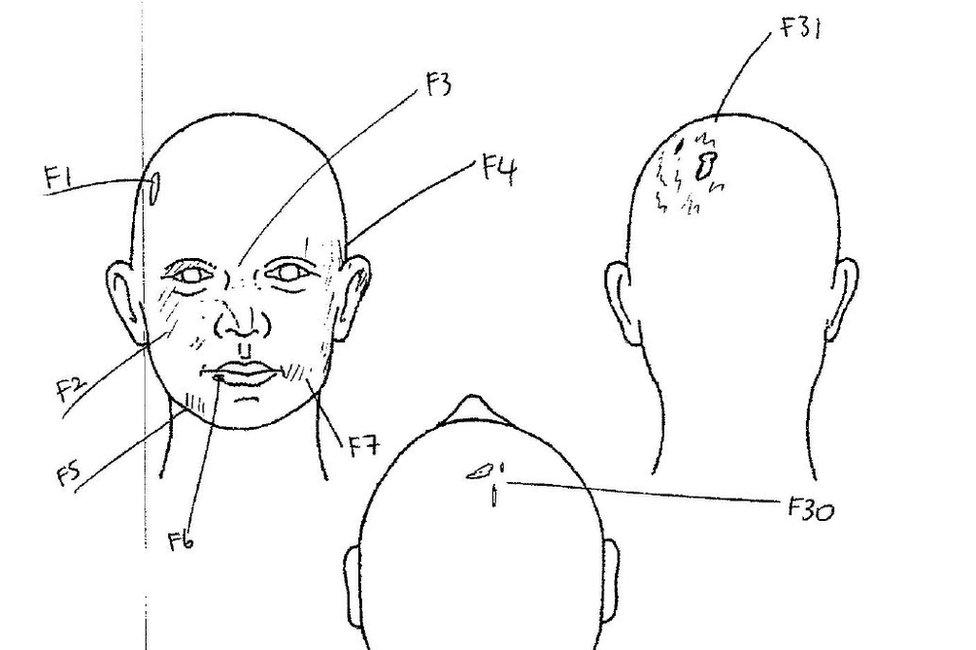
Tara Newbold's injuries included bruises, cuts and abrasions to her head and face
The post-mortem examination report listed 37 recent areas of injury over the external surface of her body, including bruises, cuts and abrasions to her head and face, and bruises and abrasions on her chest, abdomen, back, hips, buttocks, legs, arms and hands.
From the internal examination, the pathologist found that five of her ribs were fractured, with one rib fracture causing her left lung to partially collapse.
The report said these injuries "would not be expected to have caused death in this case, but could potentially explain the deceased's shortness of breath described by the deceased's partner in his initial account of the events leading up to her death".
There were also signs of previous fractures to two of her ribs, which "indicate at least one episode of blunt force trauma to the chest region on a previous occasion".
Ms Newbold had cocaine at a level of 225 ng/ml in her body, which the toxicology report described as "high recreational use".
The post-mortem report stated it "appears most likely that death was due to acute cocaine toxicity".
What did the second pathologist say?
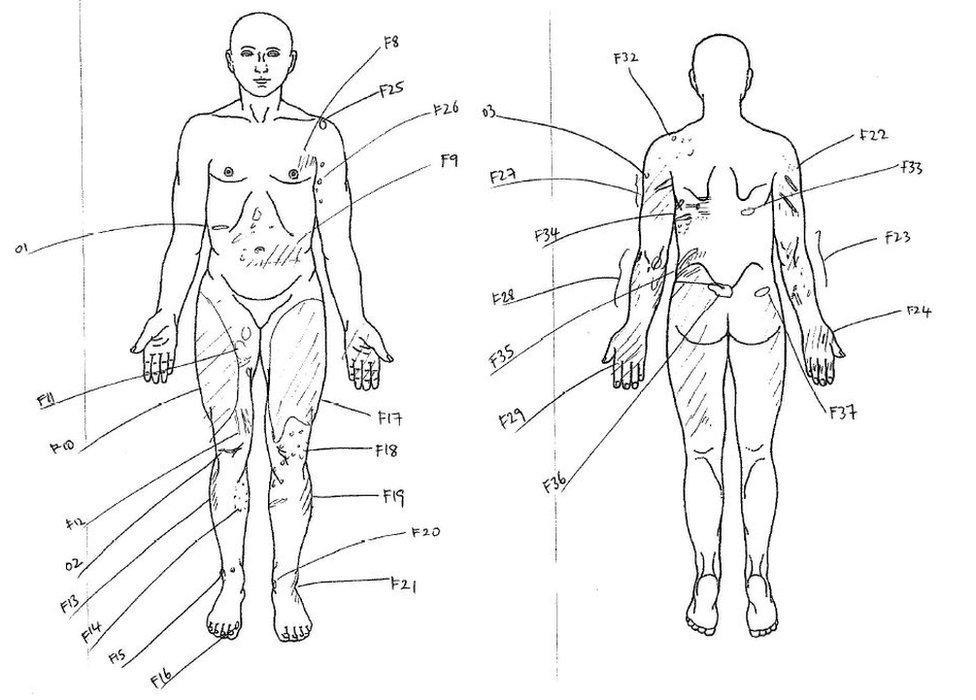
The second pathologist said Tara Newbold's injuries could not be excluded from having played a part in her death
Ms Newbold's family asked another pathologist to review the original post-mortem examination report and related materials.
Dr Stephen Leadbeatter, from the Wales Institute of Forensic Medicine, said he was "not convinced from the reports that injury can be excluded from having played a part in this death".
In his review, he said he found it "difficult to understand" why the pathologist had not considered that death could have resulted from a combination of cocaine toxicity and the injuries.
"If cocaine is considered to be fatal through the triggering of a cardiac arrhythmia, then can the stressors of blunt soft tissue injury be said to have no part to play in the triggering of such a death?" he wrote.
Ms Newbold's family maintain that she "hated drugs" and would not have taken cocaine unless forced to.
Dr Leadbeatter noted that none of Miss Newbold's head hair was submitted for toxicological analysis - which could have assisted in determining whether or not she had previously used drugs.
He said: "Where drug use is implicated in a death, knowledge of 'historical drug use' may be critical in interpretation of the significance of the concentration of the drug found in blood taken at the post mortem examination."
Why was Ballin not charged with murder?
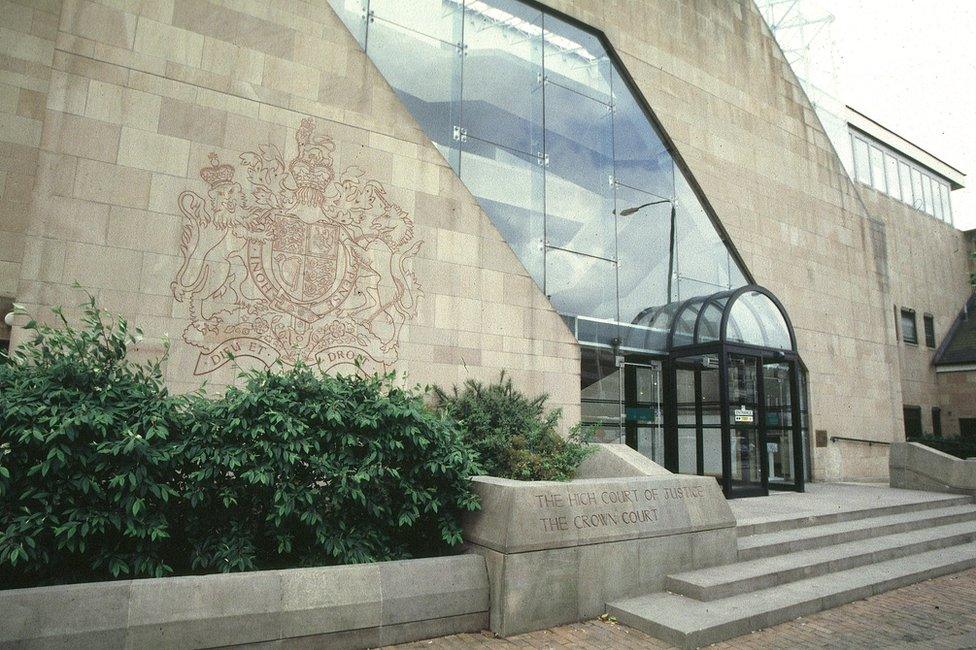
Duane Ballin was found guilty at Nottingham Crown Court of causing grievous bodily harm with intent
Ballin was charged with causing grievous bodily harm with intent but he denied this, and pleaded guilty to the lesser charge of causing grievous bodily harm.
A jury found him guilty of the more serious charge following a trial at Nottingham Crown Court.
Nottinghamshire Police said in a statement: "We have sympathy with Ms Newbold's family, who have had to deal with her loss following this tragic and complex situation.
"A Home Office post-mortem examination concluded Ms Newbold died as a result of a drug overdose, not as a result of the grievous bodily harm she suffered."
A CPS spokesperson said: "The defendant was charged with an offence where the CPS was satisfied there was a realistic prospect of conviction.
"We considered all the evidence provided by the police and made a charging decision in accordance with the evidential test contained in the Code for Crown Prosecutors."
Ms Newbold's mother and step-father are now pressing for a full inquest to examine her death, and have written to the coroners service.